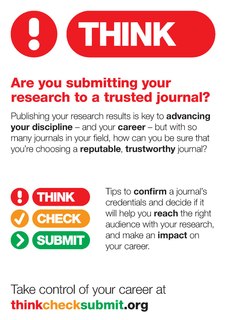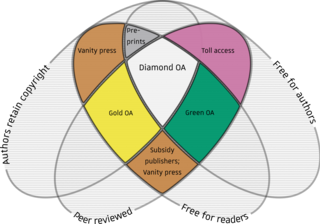
Academic publishing is the subfield of publishing which distributes academic research and scholarship. Most academic work is published in academic journal articles, books or theses. The part of academic written output that is not formally published but merely printed up or posted on the Internet is often called "grey literature". Most scientific and scholarly journals, and many academic and scholarly books, though not all, are based on some form of peer review or editorial refereeing to qualify texts for publication. Peer review quality and selectivity standards vary greatly from journal to journal, publisher to publisher, and field to field.

Open access (OA) is a set of principles and a range of practices through which research outputs are distributed online, free of access charges or other barriers. With open access strictly defined, or libre open access, barriers to copying or reuse are also reduced or removed by applying an open license for copyright.

The Directory of Open Access Journals (DOAJ) is a website that hosts a community-curated list of open access journals, maintained by Infrastructure Services for Open Access (IS4OA). The project defines open access journals as scientific and scholarly journals making all their content available for free, without delay or user-registration requirement, and meeting high quality standards, notably by exercising peer review or editorial quality control. DOAJ defines those as open access journals where an open license is used so that any user is allowed immediate free access to the works published in the journal and is permitted to read, download, copy, distribute, print, search, or link to the full texts of [the] articles, or use them for any other lawful purpose. The mission of DOAJ is to "increase the visibility, accessibility, reputation, usage and impact of quality, peer-reviewed, open access scholarly research journals".

Self-archiving is the act of depositing a free copy of an electronic document online in order to provide open access to it. The term usually refers to the self-archiving of peer-reviewed research journal and conference articles, as well as theses and book chapters, deposited in the author's own institutional repository or open archive for the purpose of maximizing its accessibility, usage and citation impact. The term green open access has become common in recent years, distinguishing this approach from gold open access, where the journal itself makes the articles publicly available without charge to the reader.

A postprint is a digital draft of a research journal article after it has been peer reviewed and accepted for publication, but before it has been typeset and formatted by the journal.
Libertas Academica (LA) is an open access academic journal publisher specializing in the biological sciences and clinical medicine. It was acquired by SAGE Publications in September 2016.
A hybrid open-access journal is a subscription journal in which some of the articles are open access. This status typically requires the payment of a publication fee to the publisher in order to publish an article open access, in addition to the continued payment of subscriptions to access all other content. Strictly speaking, the term "hybrid open-access journal" is incorrect, possibly misleading, as using the same logic such journals could also be called "hybrid subscription journals". Simply using the term "hybrid access journal" is accurate.
In academic publishing, an embargo is a period during which access to academic journals is not allowed to users who have not paid for access. The purpose of this is to ensure publishers have revenue to support their activities, although the impact of embargoes on publishers is hotly debated, with some studies finding no impact while publisher experience suggests otherwise. A 2012 survey of libraries by the Association of Learned, Professional, and Society Publishers on the likelihood of journal cancellations in cases where most of the content was made freely accessible after six months suggests there would be a major negative impact on subscriptions, but this result has been debated.
An open-access mandate is a policy adopted by a research institution, research funder, or government which requires or recommends researchers—usually university faculty or research staff and/or research grant recipients—to make their published, peer-reviewed journal articles and conference papers open access (1) by self-archiving their final, peer-reviewed drafts in a freely accessible institutional repository or disciplinary repository or (2) by publishing them in an open-access journal or both.
The Global Open Access List (GOAL), until January 2012 the American Scientist Open Access Forum, is the longest-standing online discussion forum on Open Access. It was created by the American Scientist, which is published by Sigma Xi, in September 1998, before the term "Open Access" (OA) was coined, and it was originally called the "September98-Forum." Its first focus was an article published in American Scientist in which Thomas J Walker of the University of Florida proposed that journals should furnish free online access out of the fees authors pay them to purchase reprints. Stevan Harnad, who had in 1994 made the Subversive Proposal that all researchers should self archive their peer-reviewed research, was invited to moderate the forum, which was not expected to last more than a few months. It continued to grow in size and influence across the years and is still the site where most of the main developments in OA are first mooted, including self-archiving, institutional repositories, citation impact, research performance metrics, publishing reform, copyright reform, open access journals, and open access mandates.

The Registry of Open Access Repositories (ROAR) is a searchable international database indexing the creation, location and growth of open access institutional repositories and their contents. ROAR was created by EPrints at University of Southampton, UK, in 2003. It began as the Institutional Archives Registry and was renamed Registry of Open Access Repositories in 2006. To date, over 3,000 institutional and cross-institutional repositories have been registered.

Predatory publishing, also write-only publishing or deceptive publishing, is an exploitative academic publishing business model that involves charging publication fees to authors without checking articles for quality and legitimacy, and without providing editorial and publishing services that legitimate academic journals provide, whether open access or not. The phenomenon of "open access predatory publishers" was first noticed by Jeffrey Beall, when he described "publishers that are ready to publish any article for payment". However, criticisms about the label "predatory" have been raised. A lengthy review of the controversy started by Beall appears in The Journal of Academic Librarianship.

"Who's Afraid of Peer Review?" is an article written by Science correspondent John Bohannon that describes his investigation of peer review among fee-charging open-access journals. Between January and August 2013, Bohannon submitted fake scientific papers to 304 journals owned by fee-charging open access publishers. The papers, writes Bohannon, "were designed with such grave and obvious scientific flaws that they should have been rejected immediately by editors and peer reviewers", but 60% of the journals accepted them. The article and associated data were published in the 4 October 2013 issue of Science as open access.
An article processing charge (APC), also known as a publication fee, is a fee which is sometimes charged to authors. Most commonly, it is involved in making a work available as open access (OA), in either a full OA journal or in a hybrid journal. This fee may be paid by the author, the author's institution, or their research funder. Sometimes, publication fees are also involved in traditional journals or for paywalled content. Some publishers waive the fee in cases of hardship or geographic location, but this is not a widespread practice. An article processing charge does not guarantee that the author retains copyright to the work, or that it will be made available under a Creative Commons license.
The following is a timeline of the international movement for open access to scholarly communication.

In France, open access to scholarly communication is relatively robust and has strong public support. Revues.org, a digital platform for social science and humanities publications, launched in 1999. Hyper Articles en Ligne (HAL) began in 2001. The French National Center for Scientific Research participated in 2003 in the creation of the influential Berlin Declaration on Open Access to Knowledge in the Sciences and Humanities. Publishers EDP Sciences and OpenEdition belong to the international Open Access Scholarly Publishers Association.
In Canada the Institutes of Health Research effected a policy of open access in 2008, which in 2015 expanded to include the Natural Sciences and Engineering Research Council and Social Sciences and Humanities Research Council. The Public Knowledge Project began in 1998 at University of British Columbia. Notable Canadian advocates for open access include Leslie Chan, Jean-Claude Guédon, Stevan Harnad, Heather Morrison, and John Willinsky.

The idea and practise of providing free online access to journal articles began at least a decade before the term "open access" was formally coined. Computer scientists had been self-archiving in anonymous ftp archives since the 1970s and physicists had been self-archiving in arXiv since the 1990s. The Subversive Proposal to generalize the practice was posted in 1994.

Open access (OA) to academic publications has seen extensive growth in Australia since the first open access university repository was established in 2001 and OA is a fundamental part of the scholarly publishing and research landscape in Australia. There are open access policies at the two major research funders: The National Health and Medical Research Council (NHMRC) and Australian Research Council (ARC) and around half of Australian Universities have an OA policy or statement. Open Access Australasia, the Council of Australian University Librarians (CAUL), and the Australian Library and Information Association (ALIA) are advocates for Open Access and related issues in Australia.

Diamond open access refers to texts published/distributed/preserved with no fees to both readers and authors. Alternative labels include platinum open access, non-commercial open access, cooperative open access or, more recently, open access commons. While these terms were first coined in the 2000s and the 2010s, they have been retroactively applied a variety of structure and forms of publishing from subsidized university publisher to volunteer-run cooperative that have existed in prior decades.










